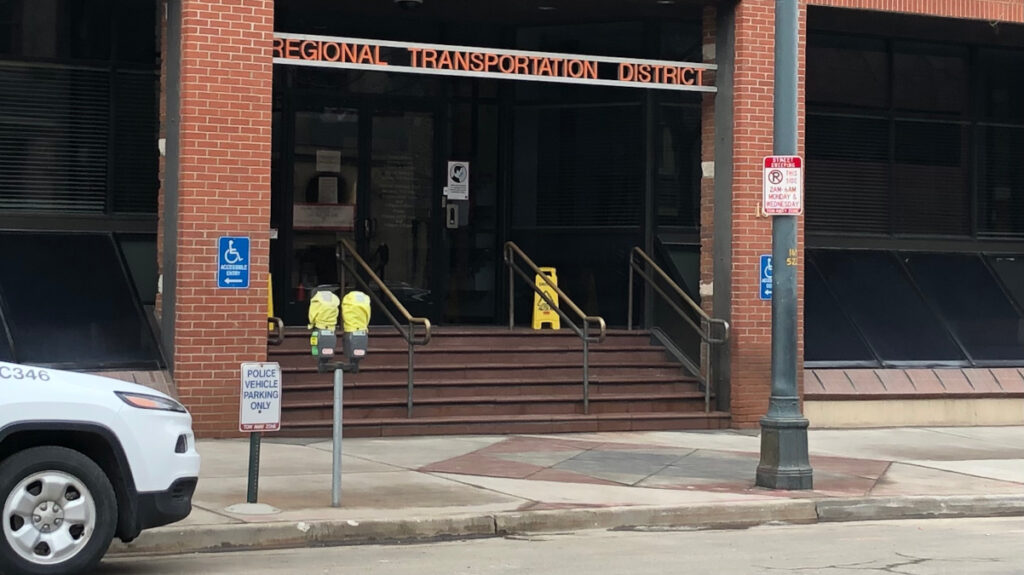By Nathaniel Minor
Colorado’s most prominent public officials are responsible for making crucial decisions on how to spend billions of dollars in taxpayers’ money every year.
And as one measure of ensuring they have in the public’s interest in mind, and not their own, state law requires them to file forms with the Colorado Secretary of State disclosing their own finances — income, property, debts and more.
That law applies to each member of the legislature, the governor, the attorney general, judges, district attorneys and even more obscure positions like appointed members of the public utilities commission.
But, as I learned recently in my duties as a transportation beat reporter for Colorado Public Radio, that law does not cover the Regional Transportation District’s 15-member elected board of directors. They oversee the operations of the transit behemoth which brought in more than $1 billion in revenue in 2019.

The RTD board’s bylaws do require that each member file a financial interest disclosure form with the district. But the agency initially denied my request for copies of those forms, citing the personnel files exemption in the Colorado Open Records Act.
After posting a string of exasperated tweets, I appealed to the chair of the RTD board, Angie Rivera-Malpiede. She secured the permission of every board member, and only then did the agency release all of the records. The body will also consider treating those types of records as public in the future, Rivera-Malpiede said at a recent board committee meeting.
But a review of the RTD board’s disclosure forms shows they contain very little information. Members must only say whether they have an “interest,” as defined in RTD’s code of ethics, in any entities that do business with RTD. If they do, they must list it.
Of the 15 board members, only Vince Buzek, who represents District J, listed an interest: His wife is the executive director of a non-profit that partners with RTD on workforce transit in the northern suburbs. He recused himself from a vote concerning the two organizations in 2019.
Comparatively, the disclosures the Public Official Disclosure Act requires are far more informative. Gov. Jared Polis’ form, for example, shows his sources of income, business interests, property, debts and more. But that law does not cover local elected officials on city councils, county commissions, school boards, special districts — and the Regional Transportation District.

“I think it was an oversight,” said former Sen. Bob Bacon, a Democrat from Fort Collins who sponsored the last bill to amend the Public Official Disclosure Law in 2010.
“Probably any elected officials ought to have been included,” Bacon added. “But I think that our being in the thick of the mix, we were thinking of ourselves and people in the executive branch, rather than those kind of peripheral elected individuals covering other kinds of entities.”
Some localities have their own disclosure requirements for public officials, said David Broadwell, former city attorney for Denver and current general counsel for the Colorado Municipal League.
“Denver has a very extensive one,” Broadwell said.
But Broadwell knows of no statewide law that applies to local officials. Neither does Ashley Kissinger, a media attorney at Ballard Spahr. The existing state law leaves out many important decision makers, she said.
“On the one hand, we don’t want to discourage people from entering public service,” Kissinger said. “On the other hand, we want people who are engaged in public service to be accountable to the people and not have conflicts of interest. Or if they do, we need to know about them so we can watch closely when they are making decisions.”
RTD directors, and employees, also fall outside of the jurisdiction of the Colorado Independent Ethics Commission, per a 2016 ruling by that body. Citizens can file complaints about most elected officials and government employees to that commission; any non-frivolous complaints are made public. RTD, by contrast, has its own bylaws and code of ethics that cover employees and elected directors.
Nathaniel Minor covers transportation and growth for Colorado Public Radio: @nbminor on Twitter; email Nathaniel Minor.
Follow the Colorado Freedom of Information Coalition on Twitter @CoFOIC. Like CFOIC’s Facebook page. Do you appreciate the information and resources provided by CFOIC? Please consider making a tax-deductible donation.



